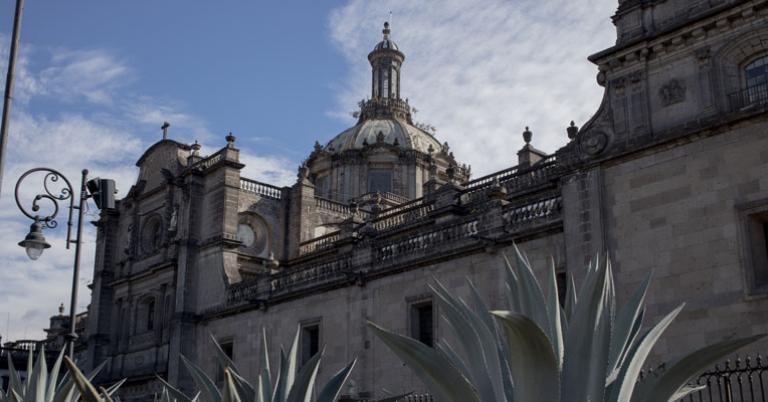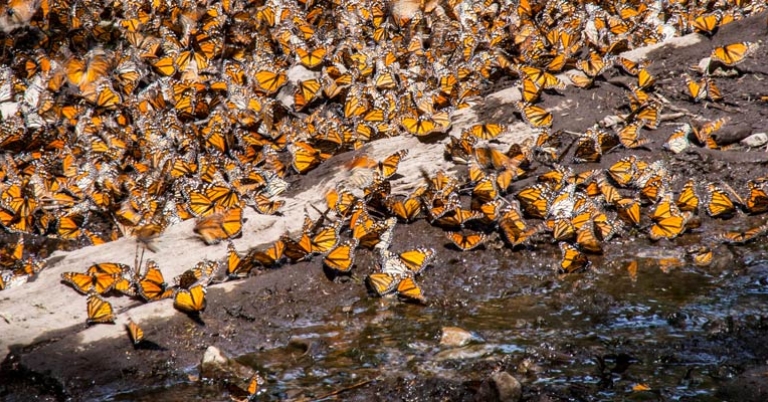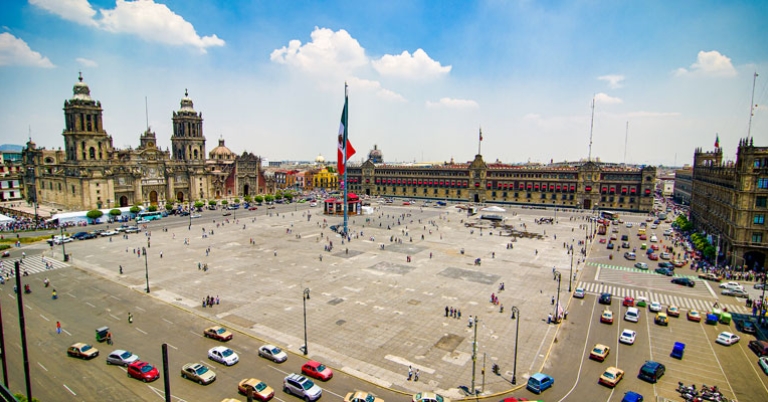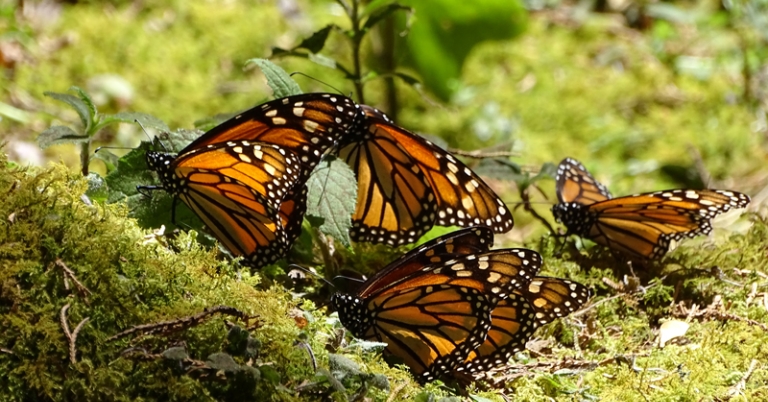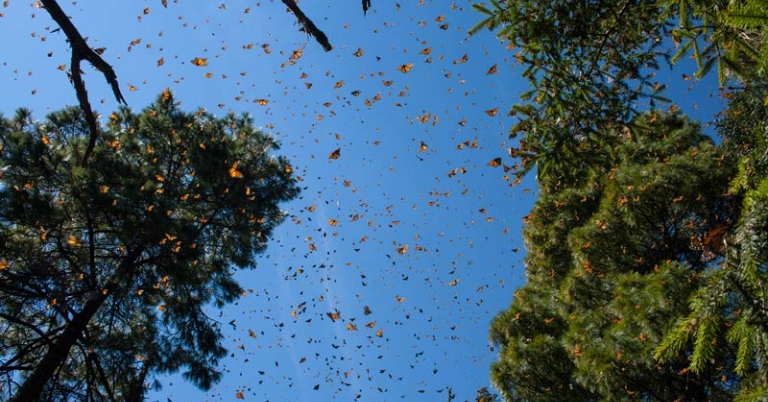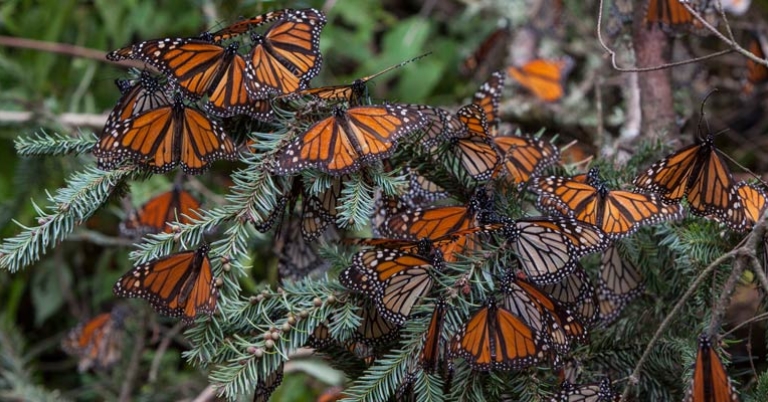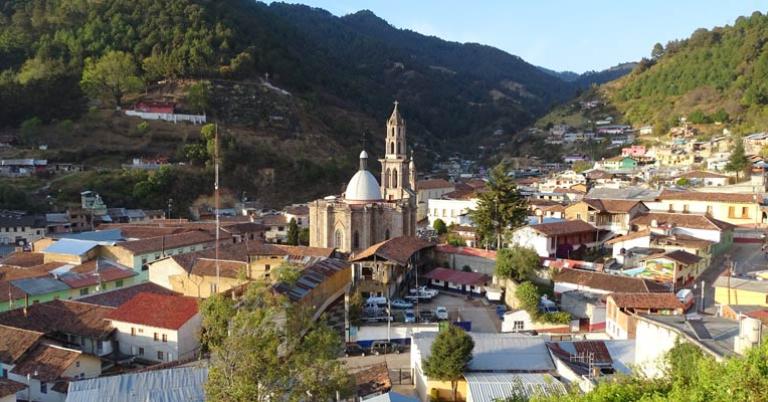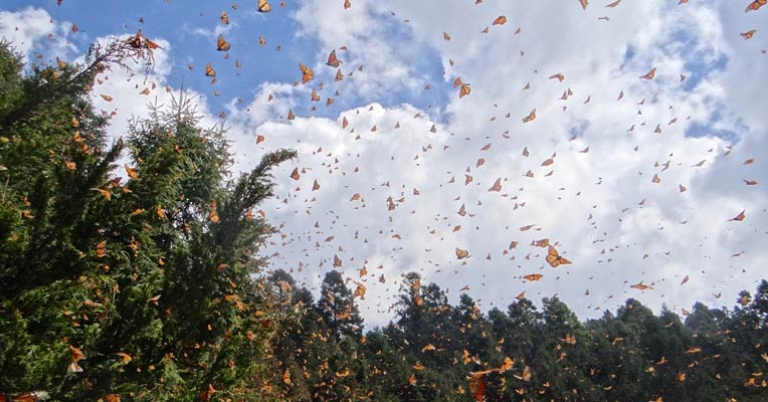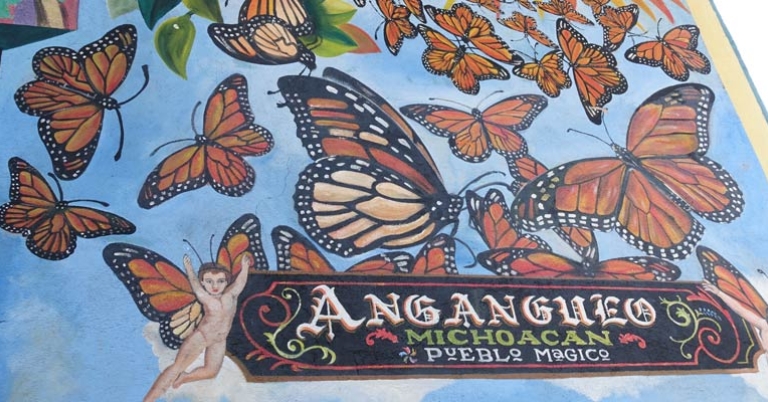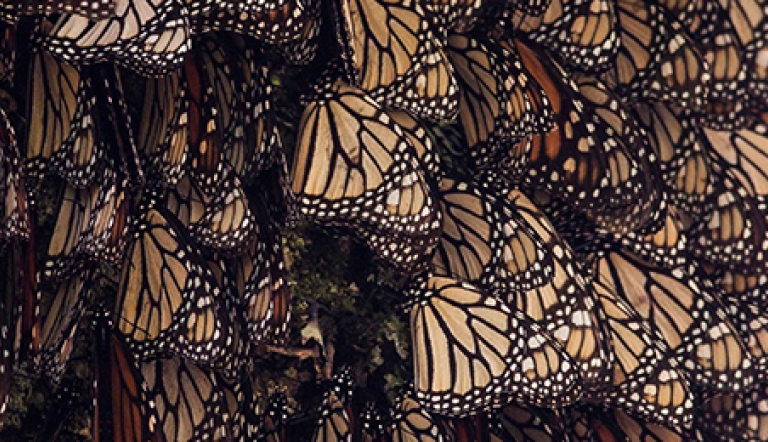Date:
Activity Level:
Duration:
Price:
Interests:
About this trip
 One of the most amazing phenomena in nature is the annual migration of Monarch butterflies (Danaus plexippus) southward from their breeding grounds in the United States and Canada to overwintering sites high in the mountains of southern Mexico. Hundreds of millions of Monarchs fly along the Gulf Coast, or across the Gulf of Mexico, to eventually reach the belt of high volcanic mountains which stretches across the southern end of the central Mexican plateau. At about a dozen isolated places within the high-altitude forests of this zone, Monarchs pass the winter in aggregations that can exceed 2 billion individual butterflies. Join Dallas Zoo to stand amid the fir-covered mountains and witness this awe-inspiring spectacle firsthand as the monarchs flutter, dip, and swoop overhead.
One of the most amazing phenomena in nature is the annual migration of Monarch butterflies (Danaus plexippus) southward from their breeding grounds in the United States and Canada to overwintering sites high in the mountains of southern Mexico. Hundreds of millions of Monarchs fly along the Gulf Coast, or across the Gulf of Mexico, to eventually reach the belt of high volcanic mountains which stretches across the southern end of the central Mexican plateau. At about a dozen isolated places within the high-altitude forests of this zone, Monarchs pass the winter in aggregations that can exceed 2 billion individual butterflies. Join Dallas Zoo to stand amid the fir-covered mountains and witness this awe-inspiring spectacle firsthand as the monarchs flutter, dip, and swoop overhead.
Highlights
- Hike or ride horseback to two different monarch reserves in Michoacán, where millions of individual monarch butterflies gather.
- Photograph the dramatic colors of the butterflies as they hang in clusters from the trees, drink from streams, feed on wildflowers, and soar in the air above.
- Spend time exploring colonial Angangueo, which was once a mining town but now derives most of its livelihood from butterfly ecotourism and agriculture.
- Take part in a service project with ECOLIFE while learning about their Clean Stove initiative, which protects local community health and the monarch butterflies.
- Explore the charming town of Metepec, renowned for its vibrant artisan culture and its Tree of Life sculptures depicting folkloric and nature-inspired themes.
Meet your leader
 Marti Copeland
Marti Copeland
Marti Copeland is the Senior Director of Education at the Dallas Zoo, where she leads a dynamic team of educators facilitating experiential learning opportunities throughout the Zoo, including in-park interpretive interactions, family programs, youth volunteers, camps, school partnerships, education events, guided tours, field trips, and a full-time nature preschool. She holds a Master’s in Education and is a certified teacher, with a deep passion for place-based learning and more than 20 years of experience in environmental education. Marti has served on statewide environmental education boards and contributed to national conservation initiatives, including African Penguin SAFE. She finds joy in exploring wild places, fostering connections to nature, and spending time outdoors with her husband and daughter.
Activity Level 4: Moderate-Strenuous
This journey is for fit and active nature enthusiasts. Daily activities last for 5 or more hours. There are challenging excursions to butterfly colonies that may require walking for approximately 2 miles at altitudes of up to 10,660 feet on some trails that are narrow and rugged. These may involve both steep uphill and downhill hikes of 30 minutes or more (hiking at your own pace), and require horseback riding for part of the way; please note there is a maximum weight limit of approximately 260 lbs to ride the horses. Restrooms are only available at the base of the mountain. Weather in the Central Highlands during the migration is typically cool and dry with average temperatures in the 50s. Though days are typically sunny, there can be some windy conditions, and nights occasionally drop below 30°F. Also included are walking tours in provincial towns and in Mexico City.
Additional Notes
During site visits, the days entail walking around the butterfly sites on your own and photographing and watching butterflies. Please be prepared to be independent during butterfly watching.
Please also see the information about Safety & Risk Management under the Travel Info tab.
$2,775
Per person
About this price
Land cost only. Does not include round-trip airfare to and from destination.
Single room supplement $650
What makes us different
Wildlife up-close
Culture in context
Hands-on learning
Meaningful experiences
Support local communities
Service anytime
Daily Itinerary
Print ItineraryMexico City
Angangueo
Angangueo
Jungapeo
Jungapeo
Mexico City
Pricing
Print Pricing$2,775
Per person
About this price
Land cost only. Does not include round-trip airfare to and from destination.
Single room supplement $650
What's Included
- Activities and meals as mentioned in itinerary
- Full time guide for the duration of your program
- Private transportation and driver for the duration of the program
- Water during meals
- Carbon Offset
What's Not Included
- International airfare
- Items of personal nature
- Tips for guide and driver
- Travel Insurance
Pricing Details
A deposit of $350 is required for participants to register and reserve space on the program. Reservations submitted beyond the final payment deadline noted below will require full payment to enroll. 120 or more days before departure: $100 cancellation fee; remaining balance is refunded. 119 - 96 before departure: full deposits of $350 is forfeited. 95 - 0 days before departure: 100% of program price is forfeited.
Holbrook Travel strongly recommends the purchase of travel protection for medical emergencies while traveling and to protect your investment. Please note the purchase of Cancel for Any Reason Coverage or to exclude pre-existing conditions with Trip Cancellation coverage may require policy purchase within 10-14 days of your initial deposit, depending upon the provider.
Single room supplement $650
Final payment due date: October 31, 2025
Travel Info
Print Travel InfoSafety & Risk Management
Please note that this program visits the Mexican state of Michoacán, which the U.S. State Department has long designated a Travel Advisory Level 4 due to criminal activity. Mexico City is designated a Level 2. Holbrook has operated programs to view the monarch migration in these locations for many years without incident, and we have strict safety protocols in place for all our destinations. However, it is ultimately up to each traveler to make their own assessment regarding safety and risk. Travelers are advised to visit https://travel.state.gov for more information.
Entry & Exit Requirements
U.S. citizens must have a valid passport book to enter Mexico. Passports must be valid for at least the duration of your stay. As this requirement is subject to change at any time without notice, we recommend at least 6 months’ validity. A passport card (as opposed to a book) is not acceptable for entry by air.
If you are not traveling with a U.S. passport, please check with the Mexican Embassy for the requirements based on your nationality.
Health Information
IMMUNIZATIONS
The Centers for Disease Control recommends that all travelers be up-to-date on routine vaccinations such as measles-mumps-rubella (MMR) vaccine, diphtheria-tetanus-pertussis vaccine, varicella (chicken pox) vaccine, and your yearly flu shot, as well as the COVID-19 vaccine, before every trip.
There are no vaccinations required for entry into Mexico. Though not required, the CDC recommends inoculation against hepatitis A, hepatitis B, and typhoid for most unvaccinated travelers to Mexico.
Please consult your physician for additional information and recommendations based on your individual circumstances.
Malaria & Other Insect-borne Illnesses
The CDC does not consider travelers to Mexico City or the Mexican state of Michoacán to be at risk for malaria.
The CDC advises that travelers to Mexico may be at risk for other insect-borne illnesses, such as dengue fever, Zika virus, and leishmaniasis, but that these are very rare at the high elevations visited on this program.
Altitude Sickness
The high elevations of Michoacán might cause some travelers to experience altitude sickness during this program. Please discuss appropriate preventative measures with your personal physician prior to travel.
The most common form of the illness is acute mountain sickness (AMS). Symptoms generally include: headache, fatigue, loss of appetite, nausea, and at times, vomiting. The two more serious, and less common, forms of altitude illness are high-cerebral edema (HACE) and high-altitude pulmonary edema (HAPE). HACE and HAPE can be potentially fatal if left untreated. Symptoms include: profound lethargy, extreme confusion, and increased breathlessness.
To alleviate symptoms of altitude sickness: stay hydrated and well-rested; eat high-carbohydrate foods; and avoid heavy, fatty foods, alcohol, sleeping pills, or narcotics during travel and in the days before arrival. Avoid heavy exercise while staying at high elevations.
Visit the CDC website for more information.
Travelers’ Diarrhea
The CDC warns that travelers’ diarrhea is the most common travel-related illness. Consumption of contaminated food and water may cause diarrhea. To avoid this, do not drink tap water, and use bottled water to brush your teeth. Avoid ice and uncooked vegetables or fruit without a peel. When in doubt, ask your guide. Restrict yourself to cooked food at restaurants, and avoid food sold on the streets. If you contract diarrhea, it is very important to drink large quantities of purified water. Consult your doctor for appropriate medication should you contract diarrhea.
SUN EXPOSURE
The effects of the sun can be damaging to the eyes and skin. Spending time outdoors exposes you to the sun’s harmful ultraviolet (UV) rays, even on cloudy days. To protect yourself from the sun, use a broad spectrum sunscreen of at least SPF 15, protect skin with clothing, wear a wide-brimmed hat and sunglasses, and drink plenty of fluids.
Respiratory Illness Protocols
Please review our Respiratory Illness Protocols page, which explains our policy and procedures if you or another traveler should develop symptoms of a respiratory illness during your trip. Your participation in a Holbrook Travel program indicates that you are in agreement with these protocols.
Resources
Print ResourcesSuggested Packing List
Everyone has personal preferences when it comes to packing; for this reason, the information below is offered as a general guide and not a definitive list. You know yourself best: Use your discretion and pack what you think will serve you, based on your personal preferences and specific itinerary. You may find many of these items in our Gear Store.
CLOTHING
Casual, comfortable field clothes are suitable for visits to the monarch sites and most other activities. You may wish to bring a slightly nicer, but still casual, outfit for your time in Mexico City.
Bring enough clothing suitable for the length of your program. Make sure to bring warm clothes, as the temperatures at 10,000 feet can be at or below 30 °F in the early morning. It can also be windy on the mountains. Layering is strongly encouraged, as the mid-day temperatures may be in the 60s or 70s.
- A combination of short-sleeved and long-sleeved shirts suitable for layering
- A combination of light- and medium-weight long pants (such as jeans, khakis, or field pants)
- Undergarments; long underwear and warm socks may be useful at night, as the rooms at Hotel Don Bruno are unheated and could get rather cold
- Warm sleepwear
- Parka or other outerwear: Temperatures may be near freezing for the first hour or two of the day.
- Socks – Bring extra pairs.
- Shoes – You'll likely want at least one pair of hiking boots for dusty forest trails or riding horseback (if desired), and/or a pair of comfortable, well-worn, closed-toe shoes with rubber soles suitable for walking on cobblestone streets, gravel paths, and uneven surfaces. In addition, you may want a pair of sturdy sport-strap sandals (e.g. Keens, Tevas, or similar) and/or casual flip-flops or sandals.
- Rain gear – Rain is infrequent, but a lightweight rain jacket or hooded poncho comes in handy should a slight drizzle or snow flurry occur. It also makes a great layer for added warmth.
- Cap or wool hat
- Bandana, scarf, or neck gaiter – These can be helpful on dusty trails.
- Gloves
- Hand warmers – Hand warmers are small, heated pouches found in outdoor sections of many large retail stores as well as specialty sports and camping stores. When you open their packaging, the oxygen reacts with the powder inside the pouches to create heat, and after about 30 minutes they heat up to 120 °F, last for about 6-10 hours, and provide considerable warmth. They come in a variety of sizes and are inexpensive. These have been very popular with travelers in the past and are another way to ensure that you are comfortable during the cool mornings and nights. Due to current security regulations at airports, we recommend you pack these in your checked luggage, NOT your carry-on bag.
Personal Toiletries
Pack toiletries based on your personal preferences and habits. Below are just a few recommendations to keep in mind.
- Shampoo, conditioner, lotion, deodorant/antiperspirant , etc. – All hotels provide shampoo and soap, but you may wish to bring your own from home if you prefer. If possible, avoid strong fragrances in consideration of your fellow travelers.
- Soap and washcloth or a small, quick-drying microfiber towel – These items are not always standard in hotels outside the US, so you may wish to bring them with you.
- Hairbrush, comb, hair ties, shower cap
- Toothbrush and toothpaste
- Razor
- Ear plugs, especially if you are a light sleeper
- Personal hygiene products
- Sunscreen and lip balm with SPF – There is a chance for sunburn when on the mountain.
- A travel pack of tissues – also useful as napkins or toilet paper if needed, as it may not be available at all stops
In addition to your personal toiletries, it is useful to pack a small medical kit, which you can easily prepare. Helpful items might include: bandages, antihistamine, a pain reliever (may be helpful for altitude headaches), motion sickness and/or altitude sickness medication (if you are prone to either), anti-diarrhea medicine, individually wrapped pre-moistened towelettes and/or hand sanitizer, antibiotic ointment, anti-fungal cream, moleskin for blisters, eye drops, tweezers, a mini sewing kit, and an extra pair of disposable contact lenses or eyeglasses if you wear them.
MISCELLANEOUS
Remember to pack valuables such as your passport, cash/credit cards, and medications in your carry-on luggage.
- Passport and photocopies of all travel documentation
- Personal insurance card and travel insurance information
- Money – ATM/credit card and cash; small bills in good condition are recommended
- Prescription medicines (if applicable), with a copy of the prescription
- Sunglasses with strap
- Small day pack for carrying water, camera gear, rain gear, clothing layers, etc. during monarch site visits
- Flashlight and/or head lamp
- Travel alarm clock or inexpensive waterproof wristwatch with alarm – Not all hotels provide alarm clocks.
- A pocket calculator or phone to assist with conversions and currency exchange
- Hot water bottle (to help warm your bed at Hotel Don Bruno)
- Binoculars with lens cleaner
- Camera and related equipment, such as charger, lenses, and extra memory cards – Be prepared to pay an extra park fee for use of a video camera (anything that looks professional-level) while in the parks.
- Reusable water bottle – Plan to buy bottled water, but you may wish to bring an extra container for refilling
- Non-perishable snacks
- Pocket-knife or multipurpose tool – Pack in your checked luggage
- Notepad or travel journal and pen
- Music or reading material for down time, long bus drives, or on the airplane, and a portable bright light to read by
- Collapsible walking stick with rubber tip
- Zip-top style bags – useful for packing toiletries, sorting clothing, storing damp or muddy shoes, or as a dry bag for protecting electronics
- Money belt
- Chargers for electronics
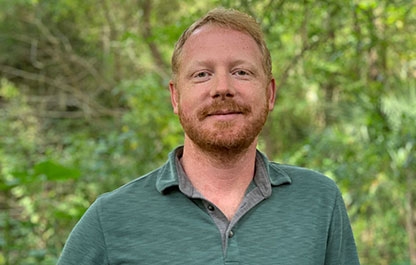
Questions
For more information, contact Kevin Van Dien at kevin@holbrooktravel.com or 800-451-7111 x312
